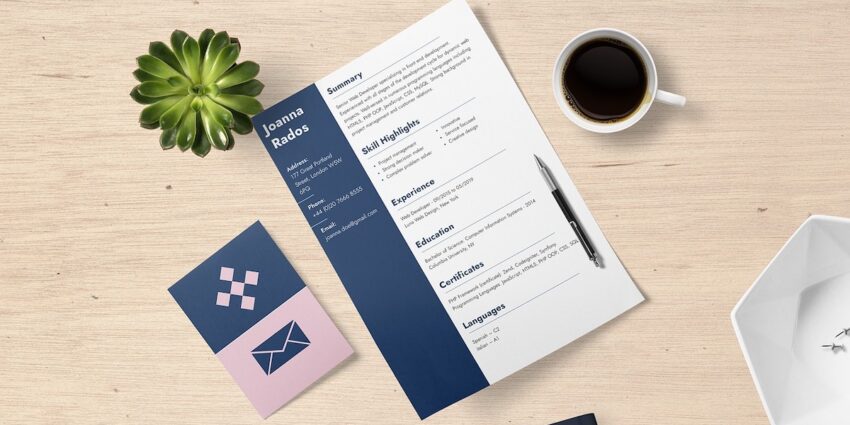How to Easily Show Remote Work on Your Resume

If you are looking to land a new remote job, your resume is the first place you can show off your experiences working remotely.
And even if you have not worked remotely full-time before, it doesn't mean you aren't qualified or won't get hired. Nor will hiring managers at remote companies ignore you just because this is your first potential remote job.
However, in either scenario it's critical that you highlight the specific skills and relevant experiences in the right places on your resume. When you do that, it can signal to the hiring manager that you'll be a great remote hire for them.
Below, I'll get into some simple and essential tips on how to show remote work experiences on your resume.
7 Tips to Show Remote Work on Your Resume
Everyone writes their resume slightly differently. For example, you may have a summary section where someone else might have a skills section instead.
Whatever resume template you choose is up to you. But just keep in mind, not every tip below may apply to your resume specifically.
1. Include any remote work experiences in your summary
Many resume templates often have a top section for a short summary.
This allows you to add a few sentences around your experiences and skills. But this can also be a great place to allude to your qualifications around working remotely and any past remote jobs.
Example, if I was writing one for myself.
I am an experienced marketing and content leader with 13+ years working in B2B and SaaS. In the last six years, I’ve worked fully-remote and helped onboard numerous distributed marketing teams around the United States.
2. Add “remote” to the location sections
Not all resumes need to include location for each job. But if you do plan on adding that, it’s a great spot to write “Remote” in there. Of course, only include if you ACTUALLY were working remotely.
If you did include it on your resume, here's how you could that:
YOUR FULL NAME
Location | Interested In Remote Work | Email | LinkedIn Profile
Personally, I do not have a location added to any job on my resume. Instead, I hint at my skills around communication, autonomy, and the organization via the work history descriptions. Which now leads me into my next tip.
3. Make a note in your resume header
A simple way to highlight your interest in working remotely or that you are looking for a remote job is to add it to your resume header.
Typically at the top of your resume you have your name , location, and contact details. But this can also be the perfect place to call out your remote work interest too.
For example, it can be a simple as this:
- Successfully onboarded and hired a marketing team of seven remotely.
- Delivered $2.2M of quarterly pipeline with our distributed team of remote employees.
- Managed high-end client projects asynchronously through Slack and project management tools.
4. Add remote work to your job history descriptions
Adding skills and remote work related content to my job history items is my favorite way to show off my experiences being remote. These bullet points are the "highlight reel" of each job and what recruiters often read through.
Think about what you’ve accomplished while working from home or remotely and call that out. Here are a few examples of how this could look:
- Successfully onboarded and hired a marketing team of seven remotely.
- Delivered $2.2M of quarterly pipeline with our distributed team of remote employees.
- Managed high-end client projects asynchronously through Slack and project management tools.
5. Incorporate it into your skills section
In some resume templates, you’ll notice a skills section. Sometimes this section can be found near the top of a resume, other times at the bottom.
But this is a section to list various skills related to your job or technologies you are familiar with.
Since I'm a marketer, I would put things like paid advertising, marketing automation, content creation, social media, etc.
However, you could also mix in skills related to working remotely too or hint you can handle a remote job.
Think of areas you succeed in but try to avoid cliche statements like detail oriented, highly organized, strong time management, etc. You can also drop in some software you are familiar with that is related to remote work like Zoom, Slack, Teams, Trello, etc.
6. Add remote work to your job title
Another way to showcase remote work on your resume is to directly include it to your job titles where relevant. If you had a job that was fully-remote, you can include it there.
Using the marketing job title theme again, here's how I recommend to show this on your resume:
- Remote Marketing Manager
- Marketing Manager (Remote)
If you are highlighting remote work in your job description and location, you probably do not need to include it on the job title too.
While it shouldn’t harm you, I’m always cautious to not overdo it and stuff remote work keywords everywhere. But up to you, it’s really a personal preference.
7. Create a section for your remote work experience
Lastly, you can get a bit creative and have a dedicated section around your remote work experience. This might be more challenging pending how long your resume is already, since you don’t want one longer than two pages.
There are two ways I recommend potentially doing this.
- First, break a small separate section from your summary at the top of your resume. Have a short second paragraph dedicated to all things remote work.
- Second, at the end of your job history you can include a note about working remotely, skills, and why you value this form of work.
What If You Haven’t Worked Remotely Before?
You might be worried that you won't get hired remotely without experience in that form of work, right?
While being fully-remote in prior roles can give some advantage, you still can get the job without that too.
There are a few areas hiring managers want to see:
- Strong communications skills
- Ability to work independently
- Your organizational strengths
- The technology skills you have
So if you can weave these areas into your resume, cover letter, LinkedIn, and during your job interview — you can still easily be qualified to be hired remotely.
Start to think about unique angles to present that you'll be a great remote employee.
How do you manage time and projects without supervision? What's your communication style like with co-workers located in different offices and timezones? What kind of technologies are you using to collaborate with clients or colleagues?
Those kind of questions will help you showcase the right kind of accomplishments to the hiring manager. And it ensures you a better chance of being offered the remote job without prior remote work experience.
Don’t Forget Your LinkedIn Profile and Cover Letter
Beyond your resume, you should also add skills and experiences of working remotely onto your LinkedIn profile and in a cover letter.
The more you can hint and align with the remote job in different mediums, the better chance you have snagging an interview.
There are a few things you can do here to show you have the chops to handle remote work.
- Add the location of any remote role you’ve had as “remote.”
- Utilize similar talking points from your resume underneath the positions you have listed.
- In your “About” summary, talk about working remotely and how you work in flexible environments around your core job field.
- You could add something that hints to your remote work experience in your profile headline. For example, “Leading remote marketing teams and scaling growth.”
Looking for more LinkedIn related tips? Check out these articles:
- “Open to Work” on LinkedIn [The Complete Guide]
- How to Respond to a Recruiter on LinkedIn [With Examples]
- 5 Effective LinkedIn Headline Examples for Job Seekers
Cover Letter
Although I’m not a big fan of cover letters, you probably will still be writing some in your job search.
And since you have more space to talk about the role and your experiences, it’s another great way to include your remote work experiences.
Add a few sentences around how you work remotely, communication processes, and why this type of work is energizing and productive for you.
I wouldn’t linger too long in your cover letter about remote work. But having some call out around this when applying to a remote job will help you stand out.








